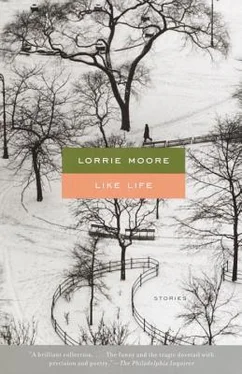“Here,” she said to Heffie. “This is for you.” Heffie laughed, gravelly and loud, then took the tag and stuck it in one of her barrettes, up near the front, where the hair was vanishing, and the deforested scalp shone back in surprise, pale but constant, beneath.
YOU HAD TO GET OUT of them occasionally, those Illinois towns with the funny names: Paris, Oblong, Normal. Once, when the Dow-Jones dipped two hundred points, the Paris paper boasted a banner headline: NORMAL MAN MARRIES OBLONG WOMAN. They knew what was important. They did! But you had to get out once in a while, even if it was just across the border to Terre Haute, for a movie.
Outside of Paris, in the middle of a large field, was a scatter of brick buildings, a small liberal arts college with the improbable name of Hilldale-Versailles. Zoë Hendricks had been teaching American History there for three years. She taught “The Revolution and Beyond” to freshmen and sophomores, and every third semester she had the Senior Seminar for Majors, and although her student evaluations had been slipping in the last year and a half— Professor Hendricks is often late for class and usually arrives with a cup of hot chocolate, which she offers the class sips of —generally, the department of nine men was pleased to have her. They felt she added some needed feminine touch to the corridors — that faint trace of Obsession and sweat, the light, fast clicking of heels. Plus they had had a sex-discrimination suit, and the dean had said, well, it was time.
The situation was not easy for her, they knew. Once, at the start of last semester, she had skipped into her lecture hall singing “Getting to Know You”—both verses. At the request of the dean, the chairman had called her into his office, but did not ask her for an explanation, not really. He asked her how she was and then smiled in an avuncular way. She said, “Fine,” and he studied the way she said it, her front teeth catching on the inside of her lower lip. She was almost pretty, but her face showed the strain and ambition of always having been close but not quite. There was too much effort with the eyeliner, and her earrings, worn no doubt for the drama her features lacked, were a little frightening, jutting out from the side of her head like antennae.
“I’m going out of my mind,” said Zoë to her younger sister, Evan, in Manhattan. Professor Hendricks seems to know the entire sound track to The King and I. Is this history? Zoë phoned her every Tuesday.
“You always say that,” said Evan, “but then you go on your trips and vacations and then you settle back into things and then you’re quiet for a while and then you say you’re fine, you’re busy, and then after a while you say you’re going crazy again, and you start all over.” Evan was a part-time food designer for photo shoots. She cooked vegetables in green dye. She propped up beef stew with a bed of marbles and shopped for new kinds of silicone sprays and plastic ice cubes. She thought her life was “OK.” She was living with her boyfriend of many years, who was independently wealthy and had an amusing little job in book publishing. They were five years out of college, and they lived in a luxury midtown high-rise with a balcony and access to a pool. “It’s not the same as having your own pool,” Evan was always sighing, as if to let Zoë know that, as with Zoë, there were still things she, Evan, had to do without.
“Illinois. It makes me sarcastic to be here,” said Zoë on the phone. She used to insist it was irony, something gently layered and sophisticated, something alien to the Midwest, but her students kept calling it sarcasm, something they felt qualified to recognize, and now she had to agree. It wasn’t irony. What is your perfume? a student once asked her. Room freshener , she said. She smiled, but he looked at her, unnerved.
Her students were by and large good Midwesterners, spacey with estrogen from large quantities of meat and cheese. They shared their parents’ suburban values; their parents had given them things, things, things. They were complacent. They had been purchased. They were armed with a healthy vagueness about anything historical or geographic. They seemed actually to know very little about anything, but they were extremely good-natured about it. “All those states in the East are so tiny and jagged and bunched up,” complained one of her undergraduates the week she was lecturing on “The Turning Point of Independence: The Battle at Saratoga.” “Professor Hendricks, you’re from Delaware originally, right?” the student asked her.
“Maryland,” corrected Zoë.
“Aw,” he said, waving his hand dismissively. “New England.”
Her articles — chapters toward a book called Hearing the One About: Uses of Humor in the American Presidency —were generally well received, though they came slowly for her. She liked her pieces to have something from every time of day in them — she didn’t trust things written in the morning only — so she reread and rewrote painstakingly. No part of a day, its moods, its light, was allowed to dominate. She hung on to a piece for over a year sometimes, revising at all hours, until the entirety of a day had registered there.
The job she’d had before the one at Hilldale-Versailles had been at a small college in New Geneva, Minnesota, Land of the Dying Shopping Mall. Everyone was so blond there that brunettes were often presumed to be from foreign countries. Just because Professor Hendricks is from Spain doesn’t give her the right to be so negative about our country. There was a general emphasis on cheerfulness. In New Geneva you weren’t supposed to be critical or complain. You weren’t supposed to notice that the town had overextended and that its shopping malls were raggedy and going under. You were never to say you weren’t fine thank you and yourself. You were supposed to be Heidi. You were supposed to lug goat milk up the hills and not think twice. Heidi did not complain. Heidi did not do things like stand in front of the new IBM photocopier, saying, “If this fucking Xerox machine breaks on me one more time, I’m going to slit my wrists.”
But now, in her second job, in her fourth year of teaching in the Midwest, Zoë was discovering something she never suspected she had: a crusty edge, brittle and pointed. Once she had pampered her students, singing them songs, letting them call her at home, even, and ask personal questions. Now she was losing sympathy. They were beginning to seem different. They were beginning to seem demanding and spoiled.
“You act,” said one of her Senior Seminar students at a scheduled conference, “like your opinion is worth more than everybody else’s in the class.”
Zoë’s eyes widened. “I am the teacher,” she said. “I do get paid to act like that.” She narrowed her gaze at the student, who was wearing a big leather bow in her hair, like a cowgirl in a TV ranch show. “I mean, otherwise everybody in the class would have little offices and office hours.” Sometimes Professor Hendricks will take up the class’s time just talking about movies she’s seen. She stared at the student some more, then added, “I bet you’d like that.”
“Maybe I sound whiny to you,” said the girl, “but I simply want my history major to mean something.”
“Well, there’s your problem,” said Zoë, and with a smile, she showed the student to the door. “I like your bow,” she added.
Zoë lived for the mail, for the postman, that handsome blue jay, and when she got a real letter, with a real full-price stamp, from someplace else, she took it to bed with her and read it over and over. She also watched television until all hours and had her set in the bedroom, a bad sign. Professor Hendricks has said critical things about Fawn Hall, the Catholic religion, and the whole state of Illinois. It is unbelievable. At Christmastime she gave twenty-dollar tips to the mailman and to Jerry, the only cabbie in town, whom she had gotten to know from all her rides to and from the Terre Haute airport, and who, since he realized such rides were an extravagance, often gave her cut rates.
Читать дальше












